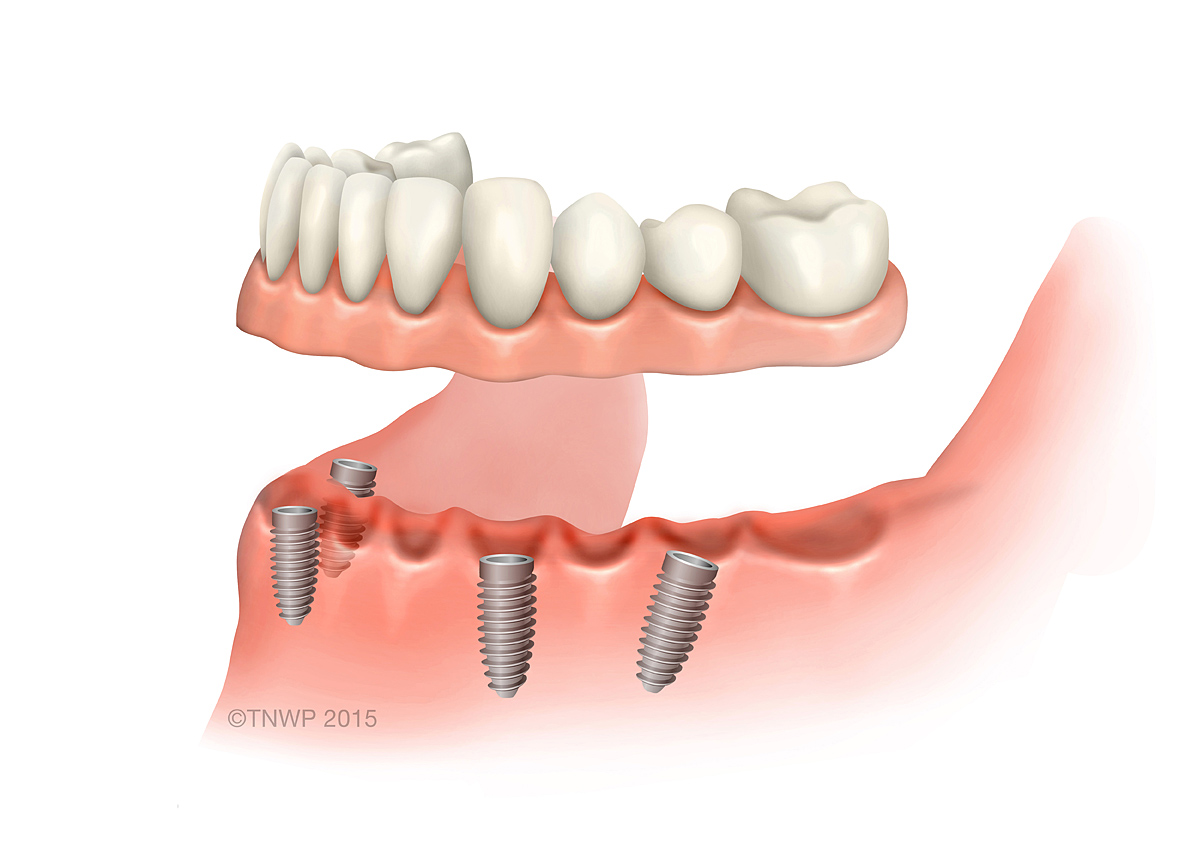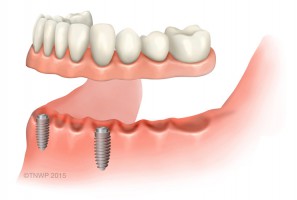Can I have dental implants to replace a full arch of missing teeth?
If you are missing a full jaw of teeth, you may opt for a conventional removable denture to replace them. But you don’t have to settle for standard false teeth. An implant-supported complete arch bridge, a denture retained by implants, or fixed teeth in a day could be alternative restorative options. All these methods use dental implants to anchor the replacement teeth.
A dental implant is inserted into the jawbone to replace a missing tooth root. Usually made of titanium, the implants can support replacement teeth such as individual crowns, multiple tooth bridges and full dentures. Dental implants are recommended for stability, strength, chewing power and durability. They also look, feel and function like natural teeth.
Dental implants prevent bone loss (resorption). Replacement teeth are connected to the titanium posts, which act like the root of the tooth by fusing with the jaw. Implants are the only tooth replacement option that preserves and stimulates bone growth. This can help retain your facial profile.
If your problem is missing teeth or loose, uncomfortable and poorly fitting dentures, take a look at the implant-supported restorations available to you:
Implant-supported complete arch bridge
There are three main options. All are supported by implants, so they are not resting on the gums:
Permanently fixed porcelain bridge
A permanently fixed porcelain bridge is similar to a conventional dental bridge, but is supported by implants and not by natural teeth. The number of implants necessary for a full-arch bridge varies depending on your particular anatomy. A permanently fixed bridge is completely secure and cannot move, but can still be removed by a dentist for cleaning.
Acrylic bridge supported by four implants
An acrylic bridge offers a solid foundation for natural chewing function and is still easily removable by the patient for cleaning. This option combines the security of a fixed implant bridge with the convenience of a removable denture. The bridge is made from the same materials as a conventional denture and, once the implants are in place, it can be fitted by a general dentist.
Removable clip-retained denture (implant-supported overdentures)
Implant-supported, clip-retained overdentures are a full set of dentures that clip into place along your jawline. The denture is supported by dental implants, but still allows for some movement during normal chewing, due to slack in the securing clips. Your implant dentist will attach a supporting structure to the implants, so that you can snap your overdentures into place for increased stability and comfort when eating, drinking, smiling and speaking. The overdenture can be removed for cleaning and maintenance.
Denture stabilisation

Using implants to secure, but not support a denture, is one of the most cost-effective ways of replacing all the teeth in one jaw. Implant-stabilised dentures rest on the gum, but have two or four implants with locator abutments to hold them in place. The attachments work in a similar way to press stud fasteners on clothes. They lock in to the inside of the denture and can be adjusted for more or less retention. They function like a conventional denture, but without horizontal movement. The plates can be easily removed for cleaning. Patients can sometimes use their existing denture, but usually a new one is needed.
All on 4
Fixed teeth in a day, sometimes referred to as ‘Same-day teeth’ or ‘All on 4’, is a treatment technique whereby a whole jaw of failing or missing teeth is replaced with dental implants in a single visit. A minimum of four dental implants are placed into the top or bottom jaw and a full arch of fixed replacement teeth is attached to the implants on the same day. The patient benefits from having temporary natural-looking teeth fitted to the implants later that same day (immediate loading), which remain in place while the implants fuse with the jawbone. A durable, definitive set of teeth are then fitted three to six months later, after the healing period.
Replacing a full arch of missing teeth, does not have to mean wearing dentures
Traditional dentures are the cheapest teeth replacement option in the short term, but they do have a number of disadvantages. They provide relatively low chewing power, which can affect the type of foods that you eat. They can also become unstable in your mouth over time, due to resorption in your jaw. Dentures do not prevent bone loss from occurring; bone beneath a denture plate can shrink because it is not being stimulated, and the pressure on the gums from the dentures can actually increase the rate of deterioration.
Am I a candidate for implants?
Dental implant treatment is tailored to the individual. The type of restoration suitable for you will depend on the number of teeth you have lost, where your teeth are missing and your overall health. If you already wear removable dentures, you may have experienced bone or gum loss that must first be addressed before implants can be placed. Your dentist will conduct a thorough evaluation to help decide which restorative option is best for you.
Check to see if you are eligible for any of the above dental implant treatments and arrange a free exploratory consultation with a nearby implant dentist by clicking here.
